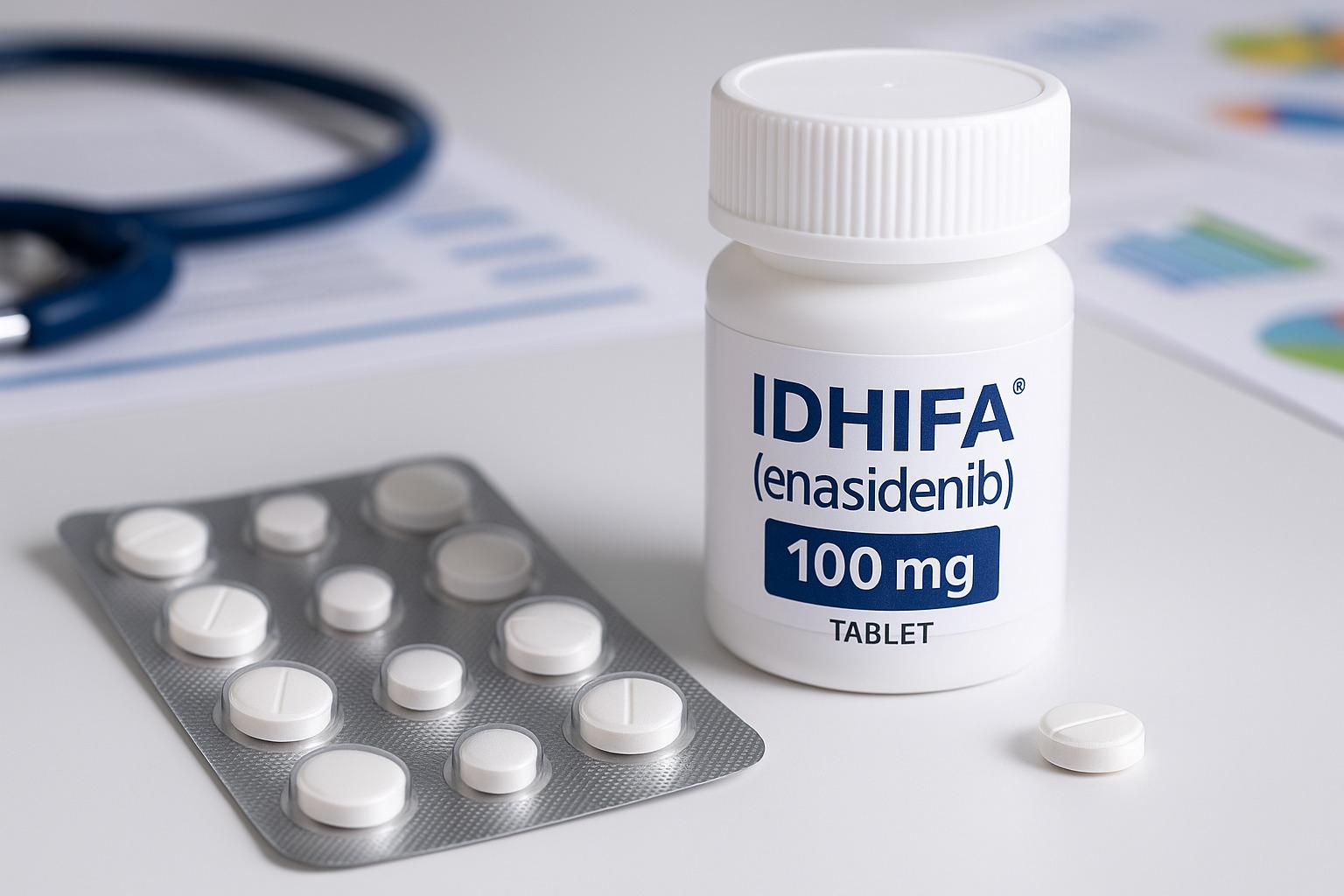Idhifa (enasidenib) is a prescription medication used to treat a specific type of blood cancer called acute myeloid leukemia (AML). It is designed for adults who have a mutation in the IDH2 gene, confirmed by a medical test.
In this easy-to-read guide, you’ll learn what Idhifa is, how it works, when doctors prescribe it, how to take it safely, possible side effects, important precautions, and answers to some of the most common questions people search online.
Quick disclaimer: This article is for education only and not a substitute for professional medical advice. Always follow your doctor’s instructions.
What is Idhifa?
Idhifa (enasidenib) is an oral medicine that targets and blocks the abnormal IDH2 protein. In patients with IDH2-mutated AML, this protein prevents immature blood cells from developing into healthy cells. By blocking the protein, Idhifa helps restore normal cell development and supports healthier blood formation.
Doctors prescribe Idhifa mainly for:
- Adults with relapsed or refractory AML (AML that has returned or not improved after other treatments).
- Patients whose AML tests positive for the IDH2 mutation.
Warnings
Follow your doctor’s instructions carefully and always read the medication guide that comes with Idhifa.
- Differentiation syndrome: Idhifa can cause a serious condition called differentiation syndrome, which may be life-threatening. Symptoms include fever, shortness of breath, cough, chest pain, swelling in arms or legs, rapid weight gain, or low blood pressure. Seek emergency help if these occur.
- Idhifa may also affect your bilirubin levels (a substance processed by the liver). Your doctor will monitor this with blood tests.
- Do not stop or change your dose unless instructed by your healthcare provider.
Before taking Idhifa
Tell your doctor if you have ever had:
- Liver disease
- Kidney disease
- Any other serious medical conditions
Also, let your healthcare provider know if you:
- Are pregnant or planning pregnancy (Idhifa may harm an unborn baby).
- Are breastfeeding or plan to breastfeed (not recommended while on this medication).
- Take other prescription drugs, over-the-counter medicines, or herbal supplements, as interactions may occur.
How do I take Idhifa?
- Take Idhifa exactly as prescribed, usually once daily.
- Swallow the tablet whole with water. Do not crush, chew, or break it.
- You can take Idhifa with or without food.
- If you vomit after taking a dose, do not take another tablet until your next scheduled dose.
- Your doctor may adjust your treatment or pause it if serious side effects occur.
What happens if I miss a dose?
- Take the missed dose as soon as you remember, unless it’s almost time for your next one.
- Do not take two doses at once.
What happens if I overdose?
- Seek emergency medical attention right away if you take more than prescribed.
What should I avoid while taking Idhifa?
- Avoid becoming pregnant while on Idhifa. Effective birth control is necessary during treatment and for at least 2 months after the last dose.
- Do not breastfeed during treatment and for at least 2 months after stopping Idhifa.
- Avoid starting or stopping any medicines without first talking to your doctor.
What are the side effects of Idhifa?
Serious side effects (get medical help immediately):
- Differentiation syndrome (fever, cough, shortness of breath, swelling, weight gain)
- High bilirubin (yellowing of skin or eyes, dark urine)
- Signs of infection (fever, chills, sore throat)
Common side effects include:
- Nausea, vomiting, or decreased appetite
- Diarrhea
- Elevated bilirubin levels
- Fatigue or weakness
- Changes in taste
This is not a full list of side effects. Always report unusual or severe symptoms to your doctor.
Storage
- Store Idhifa tablets at room temperature, away from heat and moisture.
- Keep out of reach of children.
Popular FAQ
1. Who can take Idhifa?
Only adults with AML that has an IDH2 mutation, confirmed by an FDA-approved test.
2. How long do I need to take Idhifa?
Treatment is usually long-term, depending on your response and tolerance. Some patients may take it for months or years.
3. Can Idhifa cure AML?
Idhifa is not considered a cure, but it can help control the disease and improve survival in some patients.
4. Is Idhifa chemotherapy?
No, Idhifa is a targeted therapy, not traditional chemotherapy.
5. Can Idhifa be combined with other treatments?
Your doctor may recommend additional treatments depending on your overall health and response.
Final Thoughts
Idhifa (enasidenib) is an important targeted therapy for certain patients with AML who have an IDH2 mutation. By blocking the abnormal protein, it allows bone marrow cells to develop normally, offering hope for patients with relapsed or treatment-resistant leukemia.
If you or a loved one is prescribed Idhifa, follow your doctor’s guidance carefully, watch for possible side effects, and keep regular appointments for monitoring.


I’ll right away grab your rss feed as I can not find your email subscription link or newsletter service. Do you’ve any? Please let me know in order that I could subscribe. Thanks.